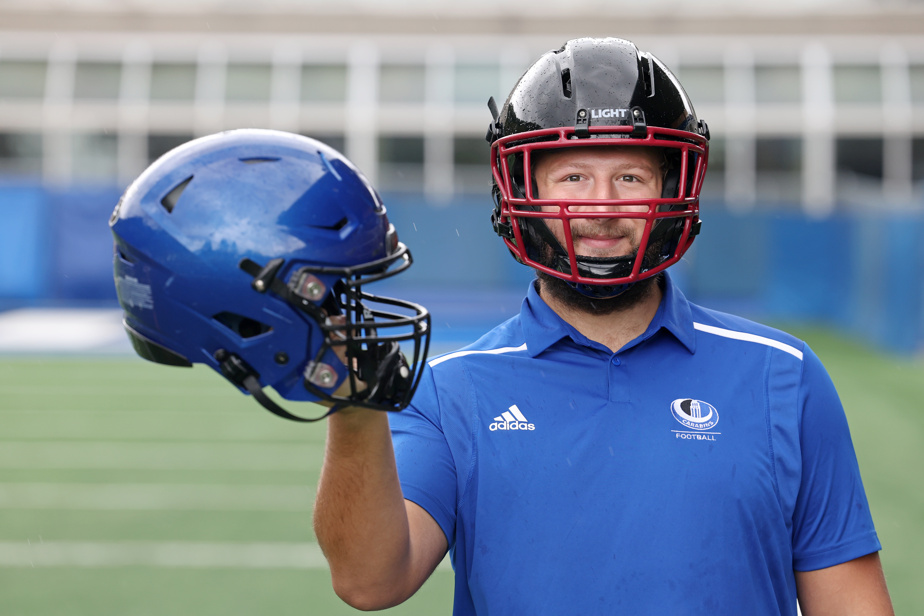“It’s very light. Really different from the others. I feel like I’m wearing a little hat rather than a helmet. »
Offensive lineman Alexandre Levac, of the University of Montreal Carabins, is impressed by the helmet prototype currently being evaluated by NFL players and developed by a Montreal consortium.
Alexandre Levac is one of the players summoned to the CEPSUM football field on Tuesday to test this 3.7-pound helmet. According to its designers, this helmet is 8% lighter than those used in the NFL.
Alexandre Levac is aware of the importance of feeling safe on the pitch, having already suffered a concussion. “Protection is the priority for all of us,” he said.
Sixteen of the thirty-two NFL teams received samples of the Gladiator helmet last month developed by Kollide, a consortium made up of three Montreal companies (Tactix, Numalogics and Kupol).
The last two teams to win the Super Bowl, the Kansas City Chiefs and the Los Angeles Rams, are among the teams that received between two and five helmets in recent weeks.
“The NFL accredited our Gladiator helmet this summer,” says Éric Gaudreau, president of the Kollide consortium.
NFL players can choose to wear whatever helmet they want, as long as it has the league’s seal of approval.
While we do not yet know exactly which players will wear the Montreal helmet this year for an NFL game, a new step could be taken for the league in its fight to reduce concussions.
The NFL launched the Helmet Challenge competition in 2019 with the aim of developing a helmet that better protects players against blows to the head. In fall 2021, the Kollide consortium helmet was chosen as one of three competition winners.
The Kollide concept is based on a cushion made up of networks of polymer cords woven in such a way as to absorb maximum energy. Kollide claims its helmets are customizable to better protect athletes based on their physiology and position on the field.
“The NFL retained our prototype in 2020 and encouraged us to continue development for another year. We did a year of optimization before submitting a helmet last September which was qualified as the best helmet compared to commercial helmets. The NFL then suggested that we market it,” says Éric Gaudreau.
To distribute his product, Kollide turned to Light Helmets, a California company with which he entered into a partnership in the spring.
The pads are manufactured in Kollide’s 3D printing facility in Montreal. Once the pads are printed, the helmets are sent to the American partner with the shell for final assembly and painting before being sent to the teams.
Éric Gaudreau estimates the market at between 800,000 and 1 million football helmets per year (professional, university and amateur). “Our partner wants to enter 50,000 to 80,000 helmets per year,” he says.
Kollide currently uses a little over thirty 3D printers in its Montreal facilities. Éric Gaudreau hopes to more than double production capacity by March in order to be able to produce up to 5,000 or even 8,000 helmets per year next year.
To achieve this, the Montreal consortium will have to achieve a capacity up to ten times greater.
Éric Gaudreau points out that there are currently four main manufacturers – Riddell, Vicis, Schutt and Xenith – which sell helmets to professional teams. He says the helmets range in price from US$1,200 to US$1,600 each.
Éric Gaudreau estimates the investment required so far since the formation of the consortium in 2019 at several million.
“The NFL gave us the equivalent of approximately $1 million to help us fund research activities and participate in the competition. We have also benefited from various subsidy programs. »
This Quebec technology could be adapted to other applications. “We want to develop a hockey helmet with our American partner and demonstrate proof of concept in other segments,” says Éric Gaudreau.
